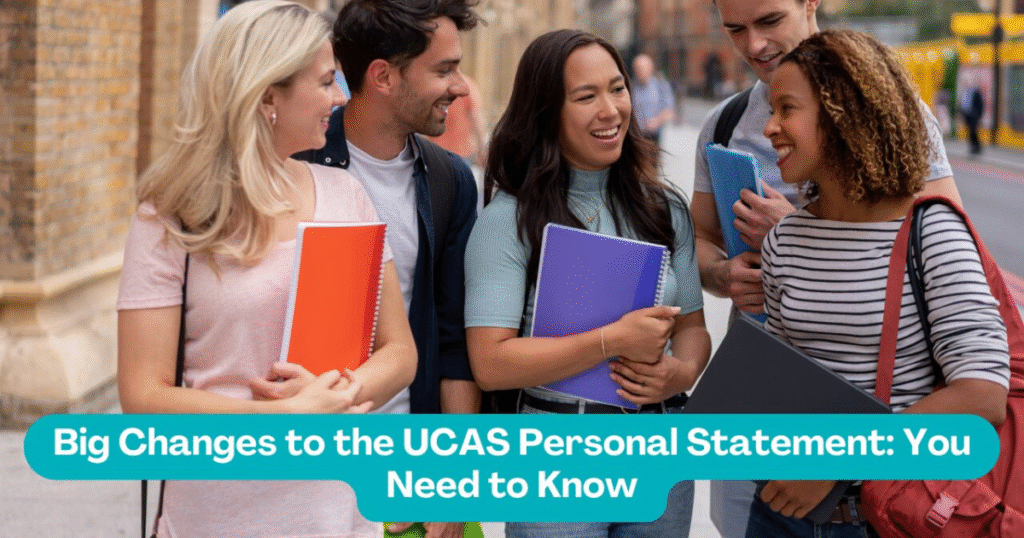UCAS Application While applying to university in the UK can feel overwhelming, UCAS (the Universities and Colleges Admissions Service) is there to help you. This guide to UCAS provides you with all of the information you require to help you apply through UCAS, understand important key deadlines, and write an effective UCAS personal statement. Regardless of whether you are UK student or international student, understanding how to apply through UCAS is essential for guaranteeing your future place at your chosen universities.
Understanding UCAS
What is UCAS?
UCAS stands for the Universities and Colleges Admissions Service, which is the central organization handling applications to undergraduate courses from all UK universities. UCAS acts as a link between students applying to university and the universities and course providers throughout the UK. UCAS allows students to complete one application form to apply to five choices of undergraduate courses at a selection of different universities, streamlining what could be a confusing and fragmented application process. This UCAS hub will provide knowledge and support to make the process of applying to university as easy as possible, including every step from what to apply for to who has the entry requirements. This universities and colleges admissions service provides an essential role in the UK education system.
Significance of UCAS in the UK
The significance of UCAS in the UK cannot be overemphasized. UCAS is the main portal for students to apply to university and it supports the application journey to university for hundreds of thousands of students each year. UCAS provide equality and transparency to applicant pathways to University and ensures that applicants, regardless of their background, have opportunities to enter higher education at UK Universities. UCAS also helps Universities and Colleges in managing their admissions so that all system-eligible students are directed to appropriate undergraduate courses. The UCAS Tariff points system standardizes qualifications, and the UCAS Undergraduate application means that all applications are viewed in a structured way. It contributes to the greater accessibility and organization of higher education.

An Overview of the UCAS Application Process
The UCAS application process for UK universities consists of a number of steps. You will need to go through these steps to successfully apply using UCAS:
1. First, register with UCAS, and complete your application form, through the UCAS hub. The application form includes your personal information, academic qualifications and your selected universities and colleges.
2. Second, write a good UCAS personal statement, showing what skills, experience and reasons you have for wanting to study your chosen course.
3. Third, choose a referee to provide a reference for you in support of your application.
4. Fourth, submit your application and application fee, by the application submission dead line.
Once you have submitted your application, UCAS will send your application on to your selected universities, who will then process and assess your application, and may then make you a conditional offer.
Applying Through UCAS
Registering with UCAS
The first step in applying to university through UCAS is to register with UCAS via the UCAS hub. This simply means creating an account and entering your basic details. You will need a valid email address and to set a secure password. Registering is simple but please try to get it right because UCAS will send all future communication relating to your UCAS application to the email address you gave them. Also, remember to keep your log in details safe as you will need your login and password throughout the UCAS process. Once you have registered, you will have access to the UCAS application form and can start filling in your application form. It is advisable to register with UCAS, so you have plenty of time to get used to the system, and it will give you lots of time to learn about all your deadlines.
How to Complete Your UCAS Undergraduate Application
Completing your UCAS undergraduate application involves completing several sections, including personal details, qualifications, etc. You will need to provide your university or college choices (you can choose up to five). You must show that you have all the qualifications listed (GCSEs, A-levels or other suitable international qualifications). You will also be required to write a strong personal statement outlining your motivations for studying your subject. You will need to nominate a referee who will provide you with a reference that supports your application to university. Make sure you take your application seriously and fill it out honestly, paying attention to your spelling and grammar. Poor grammar and spelling can indicate a lack of attention and may signal that you are not committed to the process of applying to university. You need to review entry requirements to understand what the universities are expecting in terms of qualifications.
Filling in Your UCAS Application
When filling in your UCAS application you need to take care to fill in every part of the application correctly and check all the details before you send it. As you enter the information on the application form, you want to make sure you fill it out accurately and that your personal statement is carefully finished and well communicates your passion for your subject. It’s also important to re-check the universities you have selected and the undergraduate courses you are applying for. When you’ve checked all the details if you are happy including the referee’s reference then you can pay the application fee. You will need to check the UCAS application deadlines carefully. Once your application is submitted it will be sent to the university’s you have selected. You’ll then wait for them to decide. You may even receive a conditional offer based on your predicted grades.

UCAS Application Deadlines
Important Dates for 2025 Applications
For students making university applications for the 2025 academic year, knowing the UCAS application deadlines is critical. The UCAS process follows a strict time table, and missing these application deadlines can have a serious adverse effect on your chances of getting accepted by your chosen universities. Although the typical UCAS application deadline for most undergraduate courses usually occurs in late January, it is very important to check the specific date on the UCAS hub. In the case of applications for courses such as medicine, veterinary science and dentistry, and for applications to the University of Oxford and the University of Cambridge also, these have an even earlier deadline which is almost always in mid-October. Being organized and planning early is the best way to ensure you have submitted your application on-time!
The UCAS Deadline for Submission
Understanding the UCAS deadlines for submission is important in UK application process application process. The UK application process is highly structured around specific application deadlines in order for different universities and course providers to manage the large amounts of applications they receive. The UCAS application system does have specific times after which your application cannot be accepted. The UCAS deadlines are not something to take lightly. They are not a guideline and not just a good idea. They are fair cut-off points. After the UCAS deadline, suggested deadlines may or may not become public information as soon as feasible in the event that applications have been rejected from submission. There is no guarantee if the application will be considered. So, it is highly recommended to complete your application well in advance of the final application deadlines so that any possible, almost always an issue is graciously figured out.
Implications of Missing UCAS Deadlines
If you’ve missed a UCAS application deadline, your application, should you complete it, obviously won’t be seen by your chosen universities for the academic year. You will then have to wait another year to apply. If you would like to still apply through UCAS, there are services available, such as UCAS Extra if you’ve missed the main deadline. Also, some universities and colleges will consider late applications under exceptional circumstances but this is not guaranteed. Understanding the implications of your deadlines highlights why it is so important to stick to the UCAS timeline and use the UCAS hub to aid your planning of the application process.
Admission Requirements for United Kingdom Universities
Using UCAS Tariff Points
The UCAS tariff points system is a way for UK universities to convert qualifications, such as A-levels, BTECs, and other equivalent qualifications, into a number. This helps universities and colleges compare applicants with different qualifications. Each grade achieved in a qualification receives a UCAS tariff value. Although not all universities and colleges will use the UCAS tariff points system directly, being aware of tariff points will provide insight into the academic expectations required for entry onto undergraduate courses. If you are looking at your chosen universities listed on the UCAS hub, you will need to find out whether they use UCAS tariff points or whether they prefer a certain grade in certain subjects for your UCAS application.
Generally Accepted Entry Requirements for UCAS Undergraduate Applications
It is important to be aware of the common entry requirements for undergraduate applicants in the UCAS system. The common entry requirement on UCAS applications is that the applicant has completed secondary education with grades in relevant subjects. For A-level University courses, universities and colleges typically will look for A-level grades of A*AA at the top-end or CCC at the bottom-end {and any letter combination situated in between A*AA and CCC), depending on which course and university you have applied for. Relevant international student qualifications are accepted as equivalent to UK qualifications – the UCAS hub has documentation that will help determine accepted qualifications and grades from all over the world. Meeting entry requirements is crucial to making and developing a successful application process. Always check the entry requirements of your chosen universities as entry requirements vary from institution to institution.

What to Add to Your UCAS Personal Statement
Your UCAS personal statement will be the most important part of your UCAS application where you can express your passion for your subject, and why you’d be appropriate for the course. You are providing information to ensure you can show that you are coming to university for the right reasons. So, what should you include? A strong personal statement should highlight you academic interests, relevant experience (work experience and voluntary), and career aspirations. Highlight your skills and achievements, and how they relate to the course you are applying for. Make sure your UCAS personal statement is well presented, error free, and exhibits your personality and motivations.
Following Your UCAS Application Submission
The UCAS Hub
Once you have submitted your application, the UCAS hub becomes the primary resource for aspiring students to manage and track their UCAS application. The UCAS hub allows you to track your UCAS application progress, see any offers you have received from universities, and respond to your offers. You can also use the UCAS hub to notify UCAS, and your choices if you have any questions about your application or need to update your information. It is essential that you know the UCAS hub to keep track of updates during the UCAS application process in the UK. It is the primary location for all updates regarding your UCAS application.
Keeping Track of Your Application Status
After you submit your application through UCAS, it is crucial to keep checking and tracking your UCAS application. The UCAS hub will allow you to check and stay updated with the progress of your application to university. The UCAS hub will tell you when your universities received your application, and importantly, when they make a decision. Continually checking your UCAS application will help you stay on top of things, and respond quickly when they ask you for certain things. For example, if the universities you have applied to want some more information or clarification, and you respond quickly, or if any university wants to offer you a place, by keeping on top of your application you can maximise your chances of success. Each university will update your UCAS application and keep you updated through there, it is therefore important and crucial that you are not delayed in checking, and don’t miss anything important deadlines or requests throughout your application through UCAS.
What you need to know about UCAS Extra
UCAS Extra is an option for students who have exhausted all five choices on their UCAS application, and who have either received no offers or had declined all their offers. UCAS Extra enables you to apply through UCAS to more Undergraduate courses at UK universities admitting students and who still have vacancies. This is a great opportunity to look for alternative courses, or potentially other universities, if your first period of applying hasn’t led to an offer. UCAS Extra usually opens in late February and closes early to mid-July, so it’s worth checking the UCAS hub for your specific dates. If this applies to you, it is important to put the research time into looking for courses, and spending time preparing a strong personal statement which could give you the best shot of success with UCAS Extra.

